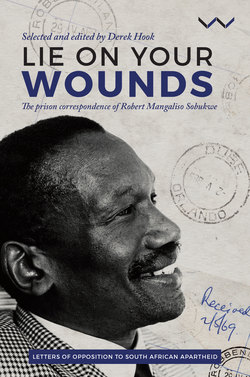Читать книгу Lie on your wounds - Robert Sobukwe - Страница 7
На сайте Литреса книга снята с продажи.
ОглавлениеAcknowledgements
The Sobukwe family – Dini, Miliswa and Otua in particular – were supportive and encouraging at each step of the book’s production. I am particularly grateful to have been invited by the family in December 2014 to Graaff-Reinet to celebrate the 90th anniversary of Robert Mangaliso Sobukwe’s birth. Benjamin Pogrund deserves thanks not only for having the foresight to save all his correspondence with (and related to) Sobukwe – the historical value of these documents speaks for itself – but for being so willing to review and provide expert commentary on my attempts at transcription and editing. I visited him in Jerusalem in late 2014, and the time I spent with him was invaluable. Although I have worked with many people whom I have respected in my career, rarely have I had the privilege of such generous support by a person with the moral integrity and courage – as the letters collected here will certainly demonstrate – of Benjamin Pogrund. It goes without saying that people interested in the life of Sobukwe would benefit from reading this volume alongside Benjamin Pogrund’s book How Can Man Die Better: The Life of Robert Sobukwe (2015).
Transcribing and editing Sobukwe’s letters was a difficult task, although I had excellent help. Lucas Goodwin and Alida Bonnet were tireless transcribers, each painstakingly converting in excess of a hundred (often poorly copied) handwritten and typed letters into text documents. They were assisted by Merryn Hook, Otua Sobukwe-Whyte (to whom I am also much indebted for her preface to this book), Julie Miller and Russell Martin. David Tomaselli helped with further editorial additions and checking dates, and Sanet le Roux compiled the index. My thanks to both.
I visited the Department of Psychology at Wits University during the time I was preparing this manuscript. I am hugely appreciative both of my colleagues in the department – Sumaya Laher and Michael Pitman particularly – but also of the research funding from both the Department of Psychology and the Faculty of Humanities at Wits. It seems fitting that the university where Sobukwe taught should have played such an important role in publishing his letters.
Gabriele Mohale at the Historical Papers Research Archive at Wits University was gracious both in helping me access the original handwritten letters and in guiding me to documents I would have overlooked. The Wits University Library deserves commendation for their upkeep of the Sobukwe letters (archived among the Robert Sobukwe Papers, Historical Papers Research Archive, University of the Witwatersrand, Johannesburg, South Africa), and for making much of this material available online: see http://www.historicalpapers.wits.ac.za/index.php?inventory/U/collections&c=A2618/R/6325. I would also like to thank the SA Jewish Museum and the Jewish Digital Archive Project for permission to reproduce a photograph of Robert Sobukwe with Benjamin Pogrund, as well as a photograph of Robert Sobukwe's children with Benjamin Pogrund's daughter.
Thanks are due also to Norman Duncan, and David and Marinda Maree, at the University of Pretoria, the South African university to which I am affiliated. Terblanche Delport and Ndumiso Dladla at Unisa were great colleagues to work with (especially in setting up a research seminar on the topic of “Sobukwe Today” at the University of Pretoria), as was Grahame Hayes, who, as editor of the journal Psychology in Society, made possible – and along with me co-edited – a special issue on Sobukwe (see: http://www.pins.org.za/issue.php?num=50).
I also wish to thank several colleagues at Duquesne University: Dean Jim Swindal (for his encouragement and support of the research costs), the Chair of the Psychology Department, Leswin Laubscher (for assisting in Afrikaans–English translation), Gerald Boodoo at the Duquesne Center for African Studies (where I benefited from being awarded the Loogman Faculty Research Grant) and Marilyn Henline. Colleagues at Birkbeck College, most notably Dan Alexander and Stephen Frosh, were also extremely supportive of the project. The Department of Psychosocial Studies at Birkbeck made it possible for me to travel to Jerusalem to visit Benjamin Pogrund. Julie Miller, my production editor at Wits University Press, went frequently beyond the call of duty in finding photographs, in having texts converted, and in many other ways. Thanks also to Russell Martin for his editorial input, and to Veronica Klipp, Corina van der Spoel, Sue Ogterop, Jeremy Phillips and Sipho Mbuqe. Finally, my thanks to the people I met with or interviewed as part of the preliminary research on the life of Robert Mangaliso Sobukwe, including Saths Cooper, Gail Gerhart, the Rev. Dumisani Methula, Johnson Mlambo, Thami ka Plaatjie, Mogobe Bernard Ramose, Dini Sobukwe, Mangaliso Sobukwe and Malaika wa Azania.
The week before this book was to be submitted for publication, Robert Sobukwe’s wife, Zondeni Veronica Sobukwe, died at the age of 91. It is to her memory that this book is dedicated.
